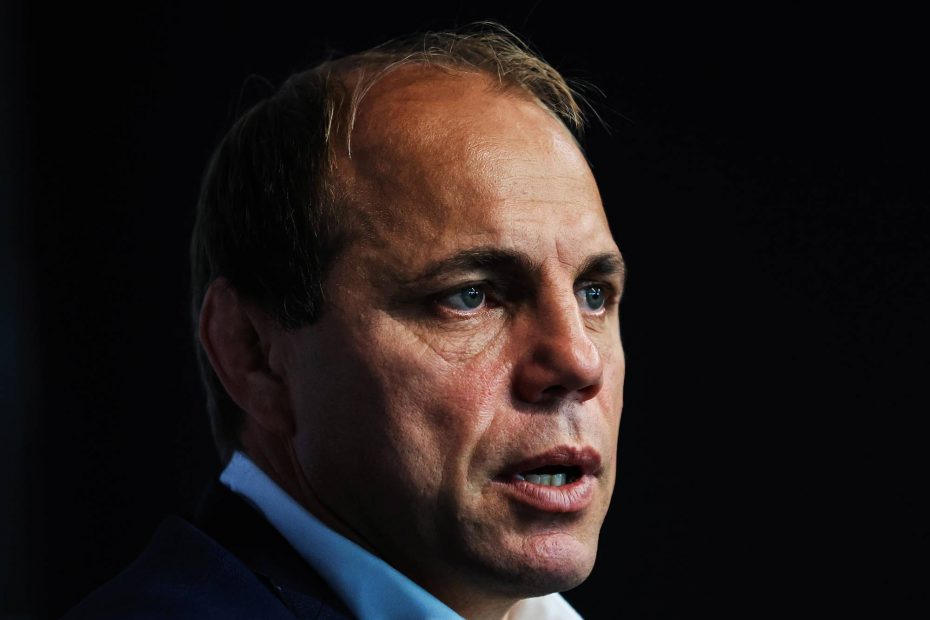Former Wallabies coach Eddie Jones has hit back at suggestions he went on an unapproved spending spree throughout last year’s World Cup campaign, saying “everything was approved”.
The veteran coach, who sensationally left the Wallabies following last year’s disaster and joined Japan almost immediately, also described teenage sensation Max Jorgensen as the type of player the nation could build their team around.
Jones’ comments come after Rugby Australia chief executive Phil Waugh released the findings of their review into the Wallabies’ World Cup disaster last week.
As well as the 23 recommendations that were released, Waugh’s admission that the Wallabies had a $2.6 million unapproved budget blow-out was the latest head-scratching moment for the cash-strapped organisation.
Rugby Australia CEO Phil Waugh last week claimed that the governing body had gone well over their World Cup budget. (Photo by Mark Evans/Getty Images for Rugby Australia)
The blow-out was put down to an increase in team costs, staff travel and player benefits.
Waugh, who joined the RA board in 2018 before taking over from Andy Marinos as CEO last June, didn’t want to point fingers at who was responsible for the blow-out, saying “I think it was a cultural deficiency that we need to rectify.”
Yet, much of the blame has fallen on Jones, as well as former team manager Chris Webb.
In an interview with The Weekend Australian, Jones hit back saying every financial decision was signed off.
“Any organisation sets a limit of what to approve, and I can tell you everything we did was approved,” Jones said.
“If someone is actually suggesting we are going and spending $2m without approval – I mean it just doesn’t happen without approval, I can tell you everything was approved.
“I wasn’t actually involved in who approves it – but ultimately everything is approved by the CEO.”
Eddie Jones has hit back at suggestions the Wallabies’ World Cup blow-out wasn’t approved. (Photo by Adam Pretty – World Rugby/World Rugby via Getty Images)
While RA’s recommendations were full of corporate speak, it revealed a deep mistrust between the playing group and governing body as well as a failure of high performance.
Jones, whose reputation took a massive whack after last year’s embarrassment, seemingly shook his head at the decision to give more oxygen to the findings in the public.
“I just laughed … it’s just a bit of comedy relief isn’t it? You know Matty Johns does it for rugby league and then we do this in public in rugby …” Jones said after being asked about the review.
Jones was heartened by Australia’s performances throughout the opening month of Super Rugby, including some of the youth starting to shine through, but said the governing body’s precarious financial position meant it would be difficult to sustain and grow whilst having five Super Rugby sides.
“I’m glad to see the Australian Super Rugby sides performing better,” Jones said. “I think that’s a really positive thing. Yeah. And some of the young talent is starting to come through and just being a bit more consistent”.
“You know, even watching a guy like Harry Wilson now, he’s probably, always been on the cusp of being a good, really good player. But now he’s playing with a bit more consistency. So I think that’s good. I think at some stage the financial reality of the supporting five teams is going to be difficult for Australia to sustain.”
He added: “There’s an inevitably about that and it’s how you go about that. They had one go with the Force and they didn’t get it right at all. Next time they’ve got to get it right, running the business of rugby and that’s a skill in itself.”
Eddie Jones says the Wallabies can build a team around Max Jorgensen. (Photo by Chris Hyde/Getty Images)
Meanwhile, Jones said RA would be wise to try and keep Jorgensen, as NRL suitors, namely the Roosters, look to and poach the 19-year-old away from rugby.
“He’s a great, great kid, he works really hard, he’s everything you want in a rugby player,” Jones said.
“I just hope rugby and I’m sure Rugby Australia is aware of how special a talent he is. You want to build your team around that sort of player.”
His comments come after The Australian reported the Roosters were prepared to offer the teenager $850,000 to switch codes.
News Corp later reported that the governing body was reassessing what they were prepared to pay their players, with upper tiers to be shifted from around $800,000 to $600,000.
Jones, who selected Jorgensen for the World Cup despite entering the tournament under an injury cloud, added that RA needed to ensure that gong forward they established a culture where players wanted to play rugby for more than just what they could earn.
“Rugby Australia has got to show how much they care for him, how much they want him,” Jones said.
“There is the money – and then there is the amount of care your employee shows you – and how you get that balance right is the key to good retention of talent and recruitment.”
Jones said Jorgensen, unlike his father Perter, who played alongside the veteran coach at Randwick, was better suited to the XV-player game.
“I think some players are born to be league players while I think his father was a guy that played rugby, but he was born to be a league player,” Jones said.
“Whereas, you know rugby is more of a tactical game. I’m not trying to decry rugby league at all. But I think Max would prefer to play rugby but yeah the [pay] gap is so big between the offers then, I think that then the gap becomes more important than the interest. The job of rugby is to close the gap with that without being silly – and I think if they can do that then you know Max would probably stay in rugby.”
